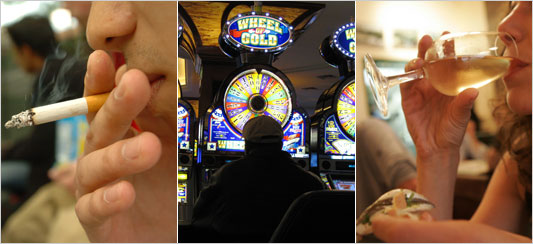
There is a reason why smokers who want to quit should never diet as they come down off the nicotine addiction. For one, they will lose friends and family. Because it’s hard enough hanging out with a grumpy ex-smoker. But also, because there is only so much self-control available in one head. If a person chooses to use it toward putting out the lung rockets, then he should concentrate on that and only that, because we humans have a limited amount of will power. It’s like coal—it could run out at any time.
I’m not making this up to rationalize all my addictions, although I am pleased that I do have some material to tell the self-critic when she thinks that there is no reason why I shouldn’t be able to master home/work boundaries, throw away the frozen bags of Kit Kats, ban all bake goods, lay off the booze (of course), not touch the cigs, cut out all diet soda (the aspartame is toxic), work out hard for at least 45 minutes four times a week (but not run anymore because my hip can’t take it), free myself from people-pleasing behavior, decrease my meal portions, limit my kids’ time spent in front of the electronic babysitter (tv), bump up story time to an hour, start walking the dogs again, yada yada yada.
When I do finally go out and try to relax with some friends, I’m supposed to savor my sparkling water (or is the carbonation bad for muscle tone?) with a (oh yeah baby, bring it on) slice of lime!!!!!
Like everything in life, will power is a learned skill, a mental muscle that people need to exercise, says Roy Baumeister, a psychology professor at Florida State University who led a study last month on the relationship between self-control and glucose levels. The researchers found that self-control is a limited resource and that by restoring glucose levels (aka SUGAR) in the study subjects, the self-control capacity increased.
Says Baumeister in a 2008 Sydney Symposium on Social Psychology:
Self-control … depends on a limited resource (akin to the folk notion of willpower and character strength). The analogy of self-control resource to a muscle is confirmed with several sets of findings. First, like a tired muscle, self-control performs relatively poorly when it has recently been exerted, even in a wholly different context. Second, like athletes conserving their strength when some has been expended, self-controllers tend to hold back on exerting self-control when they anticipate further demands. Third, just as regular exercise gradually improves physical stamina, self-control exercises can gradually make people able to sustain self-control exertions better. One important aspect of self-regulatory resources is the level of glucose in the bloodstream, which produces the fuel for brain activity and which appears to be closely tied to acts of self-control.
For example, in one study the participants who drank sugar-sweetened lemonade, which raises glucose levels quickly, did better on self-control tests than the study subjects who drank artificially-sweetened beverages that don’t affect glucose levels.
Score! You should drink the sugary stuff! Not so fast.
Says New York Times blogger Tara Parker-Post who wrote a fanstastic post about the study “How to Boost Your Will Power” (you can get to it by clicking here):
Consuming sugary drinks or snacks isn’t practical advice for a dieter struggling with willpower. However, the research does help explain why dieters who eat several small meals a day appear to do better at sticking to a diet than dieters who skip meals. “You need the energy from food to have the willpower to exert self-control in order to succeed on your diet,’’ said Dr. Baumeister.
The findings make sense because it’s long been known that glucose fuels many brain functions. Having a bite to eat appears to help boost a person’s willpower, and may explain why smokers trying to quit or students trying to focus on studying often turn to food to sustain themselves.
But there’s hope in this study. Really, there is. Again, like a mental muscle, we can grow our ability to control our cravings and addictions. It can be strengthened by the food we eat (not really sure about the details there, other than stay away from the sugar-free lemonade), but also by laughter and positive thinking (yuck, that word again). Kathleen Vohs, professor of marketing at the University of Minnesota, who participated in the research said that will-power and self-control are boosted by conjuring powerful memories of people, places, and things (aka nouns) that persons value in life.
For another version of the study, check out the New York Times Op-Ed piece, “Tighten Your Belt, Strengthen Your Mind,” which you can get to by clicking here.

